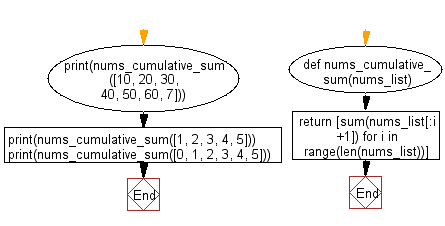Python: Compute cumulative sum of numbers of a given list
Cumulative Sum of List
Write a Python program to compute the cumulative sum of numbers in a given list.
Note: Cumulative sum = sum of itself + all previous numbers in the said list.
Sample Solution:
Python Code:
# Define a function named nums_cumulative_sum that takes a list of numbers (nums_list) as an argument.
def nums_cumulative_sum(nums_list):
# Use a list comprehension to calculate the cumulative sum for each element in the input list.
# The sum(nums_list[:i+1]) calculates the sum of elements up to the current index i.
# The loop iterates over each index i in the range of the length of the input list.
return [sum(nums_list[:i+1]) for i in range(len(nums_list))]
# Test the function with different lists of numbers and print the results.
# Test case 1
print(nums_cumulative_sum([10, 20, 30, 40, 50, 60, 7]))
# Test case 2
print(nums_cumulative_sum([1, 2, 3, 4, 5]))
# Test case 3
print(nums_cumulative_sum([0, 1, 2, 3, 4, 5]))
Sample Output:
[10, 30, 60, 100, 150, 210, 217] [1, 3, 6, 10, 15] [0, 1, 3, 6, 10, 15]
Explanation:
Here is a breakdown of the above Python code:
- Function definition:
- The code defines a function named "nums_cumulative_sum()" that takes a list of numbers (nums_list) as an argument.
- List comprehension:
- The function uses list comprehension to generate a new list where each element is the cumulative sum of the elements up to the current index.
- Summation Expression:
- The expression sum(nums_list[:i+1]) calculates the sum of elements from index 0 to the current index i.
- Loop Over Indices:
- The loop iterates over each index i in the range of the length of the input list (range(len(nums_list))).
Visual Presentation:
Flowchart:

For more Practice: Solve these Related Problems:
- Write a Python program to compute the cumulative sum of a list of integers and return a new list with the running totals.
- Write a Python program to generate a list where each element is the sum of itself and all previous numbers.
- Write a Python program to calculate running totals for a given list using itertools.accumulate.
- Write a Python program to compute the cumulative sum of an array without using built-in accumulation functions.
Go to:
Previous: Write a Python program to count the number of arguments in a given function.
Next: Write a Python program to find the middle character(s) of a given string. If the length of the string is even return the two middle characters. If the length of the string is odd, return the middle character.
Python Code Editor:
Have another way to solve this solution? Contribute your code (and comments) through Disqus.
What is the difficulty level of this exercise?
Test your Programming skills with w3resource's quiz.
